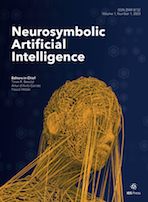Neurosymbolic Artificial Intelligence is an open access and transparently peer-reviewed research journal covering a wide range of topics related to neurosymbolic AI.
In the field of artificial intelligence (AI), recent advances in deep learning and big data have resulted in artificial neural networks attaining industrial relevance in a wide range of applications. Neural networks are now the state-of-the-art in language modeling, speech and image classification, sensor data and graph analytics, time series forecasting, and many more tasks requiring the processing of unstructured large data. By contrast, symbolic AI relies on the formalization of knowledge bases and rule-based algorithmic approaches, modeling sound and well-understood reasoning based on expert knowledge. This offers better explanations of AI via knowledge representations that can be inspected to interpret how decisions follow from inputs. However, this is challenged by unstructured large data. Neural and symbolic approaches to AI also provide deeper insights into resolving problems at which they excel. For example, deep learning excels at scene recognition, but it does not achieve state-of-the-art performance at planning, rich deductive reasoning, or complex symbol manipulation.
Neurosymbolic AI is an emerging field of AI aiming to build rich computational AI models, systems and applications by combining neural and symbolic learning and reasoning. It seeks to combine the complementary strengths of neural and symbolic AI while overcoming their respective weaknesses, either in the form of principled integration between both paradigms and forms of representation or in the form of hybrid systems combining neural and symbolic components in one architecture.
Neurosymbolic Artificial Intelligence relies on an open and transparent peer-review process. Submitted manuscripts are posted on the journal's website and are publicly available. In addition to solicited reviews selected by members of the editorial board, public reviews and comments are welcome from any researcher and can be uploaded using the journal’s website. All reviews and responses from the authors are posted on the journal homepage. All involved reviewers and editors will be acknowledged in the final printed version. While we strongly encourage reviewers to participate in the open and transparent review process, it is still possible to submit anonymous reviews.
The journal Neurosymbolic Artificial Intelligence furthermore is a proponent of Open Science Data and requires, whenever possible, that authors provide relevant data and software for evaluation and replication.
Accepted paper types:
- Research articles
- Survey articles
Key features
Open Access
The journal is gold open access and articles are published under the CC BY 4.0 license. The APC for the journal is US$1600 for accepted papers that were submitted September 1, 2025 or later. See https://neurosymbolic-ai-journal.com/content/neurosymbolic-artificial-in... for more details.
Open and Transparent Reviewing
All submitted papers are, after a cursory check, made publicly available as pre-prints. Reviews will be actively solicited by the handling editor. When a decision on a paper is reached, all reviews are also made available publicly. The name of the handling editor as well as the names of the reviewers, who have not opted out to be identified, will be mentioned in the published articles.
Speedy Reviewing
Neurosymbolic Artificial Intelligence is committed to provide authors with peer-review feedback in a timely manner.
Pre-Prints
All submitted papers are made available as pre-prints before the reviewing starts, so reviewers and readers are free to not only read but also share submitted papers.
Neurosymbolic Artificial Intelligence wishes to promote an environment in which annotated data are produced and shared with the wider research community. The journal therefore requires authors to ensure that any data used or produced in their submitted workare represented using community-based data formats and metadata standards. These data should furthermore be made openly available and freely reusable, unless privacy concerns apply.
Contact
You can contact the editors-in-chief at eic@neurosymbolic-ai-journal.com.
